The Seventh International Junior Scholars' Conference on Sinology, Swarthmore The Seventh International Junior Scholars’ Conference on Sinology was held on March 7-8, 2008 at Swarthmore College. The theme of the conference was “Self and Society: Perspectives on Chinese Cultural Studies.” This was the first major event oriented toward undergraduate students studying the study of Chinese literature and culture in the United States. The thirty-six presented papers explored a wide variety of issues, casting new critical light on Chinese studies and beyond. A presenter at the Seventh International Junior Scholars' Conference on Sinology, held March 7-8 at Swarthmore College Participants at the Seventh International Junior Scholars' Conference on Sinology Workshop on Historical Chinese Syntax, Harvard University On April 12, 2008, the Workshop on Historical Chinese Syntax, sponsored by the CCK-IUC, was held at Harvard University. The keynote speaker of the workshop was the noted professor Tsu-Lin Mei (Cornell University), who was followed by eight different paper presentations on Chinese syntactic theory and practice. Professor Mei's speech "The Proto-Sino-Tibetan Causatives" addressed the issue of voicing alternation in Old Chinese, Tibeto-Burman, and Himalayan languages. Sound in Chinese Literature and Culture, Harvard UniversityThe international conference “Sound in Chinese Literature and Culture” was held at Harvard University on April 25-26, 2008. Fourteen scholars from Taiwan, Hong Kong, China, the US, and Europe gave inspiring presentations, examining the significance of “sound,” an old topic of interest in Chinese literary studies. In general, this conference focused on three interrelated aspects of the relationship: 1) the system of meaning as constructed by sound, such as binomes and prosodic rules; 2) sound as theme and imagery in literature, such as texts on musical performance or “the sound of marketplace” that had emerged since Song and Yuan dynasties; and 3) textual transmission and circulation by way of sound, such as poetry recitation and poetry reading, dramatic performance, and other forms of oral literature. Participants of the "Sound in Chinese Literature and Culture" conference at Harvard University, April 25-26, 2008 The Fifth Annual Chinese Medieval Studies Workshop, Columbia UniversityOn May 3, 2008, the Fifth Annual Chinese Medieval Studies Workshop was held at Columbia University. Through the generous sponsorship of the Chiang Ching-kuo Foundation, this workshop was established by Wendy Swartz of Columbia University in 2003 to offer a forum for the exchange of ideas on both specific scholarly questions and the general state of the field, as well as to help foster a growing field in American academia. This workshop has been a successful forum for many fruitful dialogues and for fostering plans for future exchange and collaboration. This year, Xiaofei Tian (Harvard University) presented on Monk Faxian's journey to India; Robert Campany (USC) lectured on visualization practices in early medieval China; Christopher Nugent (Williams College) spoke on memory and memorization in Tang China; Wendi Adamek (Barnard College) discussed poems by the Nun Benxing at Bao shan; and Eugene Wang (Harvard University) presented on a visionary program in a fifth-century Dunhuang cave. These presentations were each followed by lively and engaged discussions among invited discussants (Robert Ashmore, Alan Berkowitz, Paula Varsano, Michael Puett, and Yang Lu) and local scholars. Modernism Revisited: Pai Hsien-yung and Chinese Literary Modernism in Taiwan and Beyond, University of California, Santa Barbara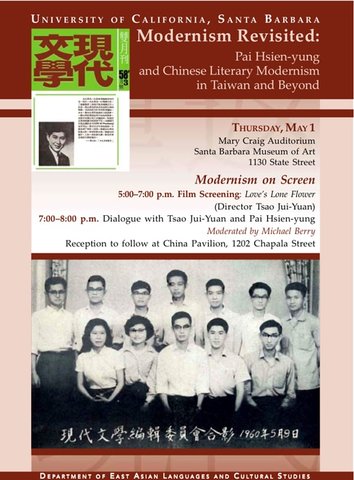 From May 1-3, 2008, the University of California, Santa Barbara, hosted the international conference, “Modernism Revisited: Pai Hsien-yung and Chinese Literary Modernism in Taiwan and Beyond,” focusing on the Chinese modernist movement of the late 1950s and early 1960s in Taiwan. The event not only brought together a dynamic group of writers, critics, and filmmakers to reflect upon this path-breaking literary movement from a historical perspective, but also attracted a large local crowd. The last panel of the conference was presented in the form of roundtable discussion where writers and scholars who engaged one another in dialogue about writing and living. Pai Hsien-yung's closing remarks concluded the first systematic and landmark approach to literary modernism in Taiwan in the English-speaking world. A roundtable of writers at the conference "Modernism Revisited" Mapping New Directions in Chinese Local History A roundtable discussion at the conference "Modernism Revisited" The "Mapping New Directions in Chinese Local History" workshop was held at Harvard University on May 29-31, 2008. Organized by Harvard professors Peter Bol, John Flower, and Michael Szonyi, the workshop drew together scholars from the United States, China, and Taiwan to reflect on the theories, methods, and findings of intensive local history research in China. A total of twenty papers were presented by senior scholars such as Chen Chunsheng, David Faure, and C.K. Wang, as well as graduate students and post-doctoral students. Their papers discussed local history projects in many different parts of China, including Sichuan, Guangzhou, Guizhou, Shanxi, and Jinmen, and Taiwan. Besides social historians, presenters also included an architechtural historian, an anthropologist, and a political scientist. To better put Chinese local history in a comparative context, comments were also offered by historians of medieval Europe and Japan. The third day was devoted to the use of new technologies to store, disseminate, and analyze local historical materials. This event was funded in part by CCK-IUC.
Comments are closed.
|
Archives
September 2020
Categories |

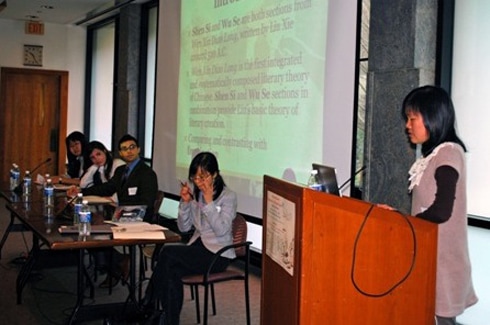
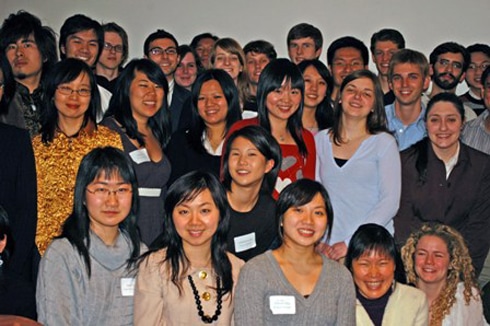
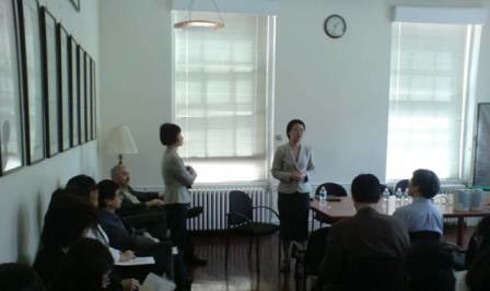
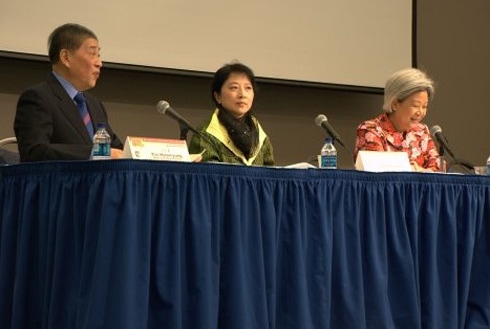
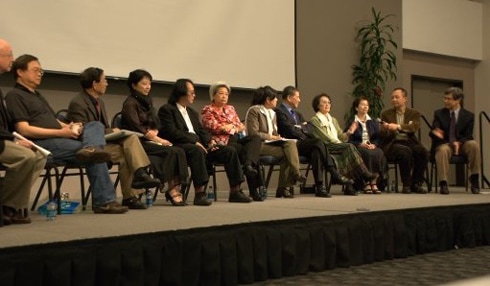
 RSS Feed
RSS Feed